Tipper operator turned detective
Page 99
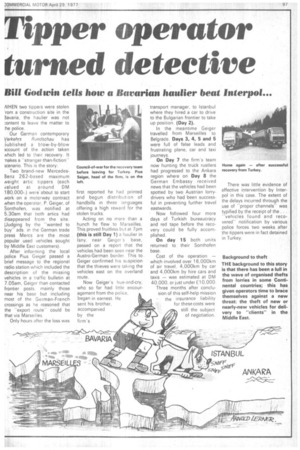
Page 100
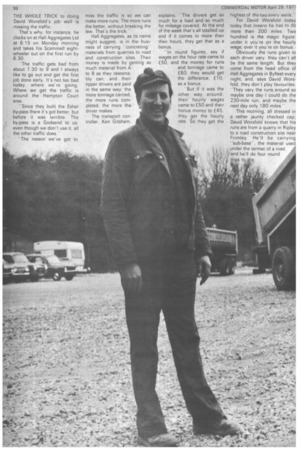
Page 101
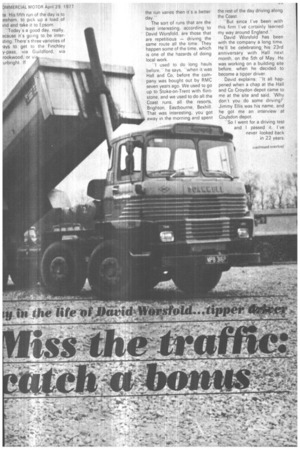
Page 102
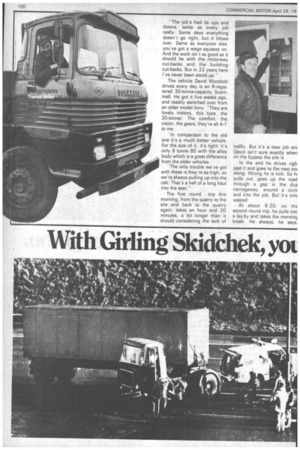
Page 103
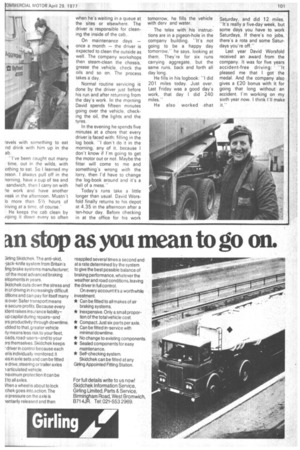
If you've noticed an error in this article please click here to report it so we can fix it.
Bill Godwin tells how a Bavarian haulier beat Interpol...
NHEN two tippers were stolen rom a construction site in the 3avaria, the haulier was not -,:ontent to leave the matter to he police.
Our German contemporary Verkehrs Rundschau has )ublished a blow-by-blow account of the action taken Nhich led to thelr recovery. It makes a -stranger-than-fiction" 'icenario. This is the story: • Two brand-new MercedesBenz 262-based maximum tveight artic tippers (each valued at around DM 180,000-) were' a bout to start Nork .on a motorway contract Nhen the operator, P. Geiger, of Sonthofen, was notified at 5.30arn that both artics had disappeared from the site. (Judging by the -wanted to buy" ads. in the German trade press Mercs are the most popular used vehicles sought by Middle East customers).
After informing the local police Pius Geiger passed a brief message to the regional radio station which included the description of the missing vehicles in a traffic bulletin at 7.05am, Geiger than contacted frontier posts, mainly those near his base but including most of the German-French crossings as he reasoned that the "export route" could be that via Marseilles.
Only hours after the loss was first reported he had printed and begun distribution of handbills in three languages offering a high reward for the stolen trucks.
Acting on no more than a hunch he flew to Marseilles. This proved fruitless but at 7 pm (this is still Day 1) a haulier in Isny, near Geiger's base, passed on a report that the vehicles had been seen near the Austro-German border. This to Geiger confirmed his suspicion that the thieves were taking the vehicles east on the overland route.
Now Geiger's hue-and-cry, who so far had little encouragement from the police, began in earnest. He sent his brother, accompanied
by the firm's transport manager, to Istanbul where they hired a car to drive to the Bulgarian frontier to take up position. (Day 2).
In the meantime Geiger travelled from Marseilles to Belgrade. Days 3, 4, 5 and 5 were full of false leads and frustrating plane, car and taxi journeys. On Day 7 the firm's team now hunting the truck rustlers had progressed to the Ankara region where on Day 8 the German Embassy received news that the vehicles had been spotted by two Austrian lorrydrivers who had been successful in preventing further travel eastwards.
Now followed four more days of Turkish bureaucracy and red tape before the recovery could be fully accomplished. On day 15 both units returned to their Sonthofen base.
Cost of the operation — which involved over 16,000km of air travel, 4,000km by car and 4,000km by hire cars and taxis — was estimated at DM 40,000, or just under El 0,000. Three months after conclusion of this self-help mission the insurance liability for these costs were still the subject of negotiation.
There was little evidence of effective intervention by Interpol in this case. The extent of the delays incurred through the use of "proper channelswas typified by the receipt of the ... 'vehicles found and recovered" notification by various police forces two weeks after the tippers were in fact detained in Turkey.
Background to theft THE background to this story is that there has been a lull in the wave of organised thefts from lorries in some Continental countries; this has given operators time to brace themselves against a new threat: the theft of new or nearly-new vehicles for delivery to "clients" in the Middle East. THE WHOLE TRICK to doing David Worst°Icrs job well is missing the traffic.
That's why, for instance, he clocks on at Hall Aggregates Ltd at 6.15 on Monday morning and takes his Scammell eightwheeler out on the first run by 6.30.
-The traffic gets bad from about 7.30 to 9 and I always like to go out and get the first job done early. It's not too bad today. where we're going. Where we get the traffic is around the Hampton Court area.
-Since they built the Esher by-pass there its got better, but before it was terrible. The by-pass is a Godsend to us; even though we don't use it, all the other traffic does.
"The reason we've got to
miss the traffic is so we can make more runs. The more runs the better, without breaking the law. That's the trick.
Hall Aggregates, as its name might suggest, is in the business of carrying "concreting" materials from quarries to road and construction sites. Their money is made by getting as much material from A to B as they reasonably can, and their tipper drivers are paid in the same way: the more tonnage carried, the more runs completed, the more the driver makes.
The transport controller, Ken Gitsham,
explains: -The drivers get so much for a load and so much for mileage covered. At the end of the week that's all totalled up and if it comes to more than their hours, they get that as a bonus.
"In round figures, say if wages on the hour rate came to £50, and the money for runs and tonnage came to £60, they would get the difference, £10, as a bonus.
"But if it was the other way around, their hourly wages came to £50 and their bonus money to £45, they get the hourly rate. So they get the highest of the two every week."
For David Worsfold today today that means he has to do more than 200 miles. Two hundred is the magic figure: under It you're on the hourly wage; over it you're on bonus.
Obviously the runs given to each driver vary: they can't all be the same length. But they come from the head office of Hall Aggregates in Byfleet every night, and, says David Worsfold, they don't play favourites. -They vary the runs around so maybe one day I could do the 230-mile run, and maybe the next day only 180 miles.
This morning, all dressed in a rather jaunty checked cap, David Worsfolcl knows that his runs are from a quarry in Ripley to a road construction site near Frimley. He'll be carrying "sub-base", the material used, , under the tarmac of a road, and he'll do four round trips tolhe te. His fifth run of the day is to )reham, to pick up a load of ind and take it to Epsom.
"Today's a good day, really, ecause it's going to be inter;ting. There's three varieties of ,ays to get to the Finchley y-pass„ via Guildford, via rookwood, or urbright. If
the run varies then it's a better day."
The sort of runs that are the least interesting, according to David Worsfold, are those that are repetitious -driving the same route all the time. They happen some of the time, which is one of the hazards of doing local work.
used to do long hauls before," he says, "when it was Hall and Co, before the company was bought out by RMC seven years ago. We used to go up to Stoke-on-Trent with flintstone, and we used to do all the Coast runs, all the resorts, Brighton, Eastbourne, Bexhill. That was interesting, you got away in the morning and spent the rest of the day driving along the Coast.
But since I've been with this firm I've c.rtainty learned my way around England,"
David VVorsfold has been with the company a long time. He'll be celebrating. his 23rd anniversary with Hall next month, on the 5th of May He was working on a building site before, when he decided to become a tipper driver.
David explains: "It all happened when a chap at the Hall and Co Croydon depot came to me at the site and said, 'Why don't you do some driving?' Jimmy Ellis was his name, and he got me an interview at Coulsdon depot.
"So I went for a driving test and I passed it. I've never looked back. in 22 years.
"The job's had its ups and downs, same as every job really. Some days everything doesn't go right, but it blows over. Same as everyone else, you've got a wage squeeze on. And the work isn't as good as it should be with the motorway cut-backs and the building cut-backs. But in 22 years here I've never been stood up."
The vehicle David Worsfold drives every day is an R-registered 30-tonne-capacity Scammell. He got it five weeks ago, and readily switched over from an older model lorry. -They are lovely motors, this type, the 30-tonner. The comfort, the vision, the gears, they're all A-1 to me.
"In comparison to the old one it's a much better vehicle. For the size of it, it's light: it's only 9 tonne 80 with the alloy body which is a great difference from the older vehicles.
-The only trouble we've got with these is they're so high, so we're always pulling up into the cab. That's a hell of a long haul into the seat."
The first round trip this morning, from the quarry to the site and back to the quarry again, takes an hour and 20 minutes, a bit longer than it should considering the lack of traffic. But it's a new job an David isn't sure exactly when on the bypass the site is.
In the end he drives righ past it and goes to the next on along. Wrong he is told. So hi pulls out, goes up the road through a gap in the dua carriageway, around a circl( and into the job. But it's tim( wasted At about 9.20: on thE second round trip, he pulls intc a lay-by and takes the morning break. He always, he says,
ravels with something to eat nd drink with him up in the ab.
-I've been caught out many time, out in the wilds, with lothing to eat So 1 learned my 3sson. I always pull off in the norning, have a cup of tea and sandwich, then I carry on with le work and have another ireak in the afternoon. Mustn't lo more than 51/2 hours of Iriving at a time, of course.'
He keeps the cab clean by wiping it down every so often when he's waiting in a queue at the sites or elsewhere. The driver is responsible for cleaning the inside of the cab,.
On maintenance days — once a month — the driver is expected to clean the outside as well. The company workshops then steam-clean the chassis, grease the vehicle, check the oils and so on. The process takes a day.
Normal routine servicing is done by the driver just before his run and after returning from the day's work. In the morning David spends fifteen minutes going over the vehicle, checking the oil, the lights and the tyres.
In the evening he spends five minutes at a chore that every driver is faced with: filling in the log book. "I don't do it in the morning, • any of it, because I don't know if I'm going to get the motor out or not. Maybe the fitter will come to me and something's wrong with the lorry, then I'd have to change the log-book around and it's a hell of a mess.'
Today's runs take a little longer than usual. David Worsfold finally returns to his depot at 4.35 in the afternoon after a ten-hour day. Before checking in at the office for his work tomorrow, he fills the vehicle with dery and water.
The telex with his instructions are in a. pigeon-hole in the company building. "It's not going to be a happy day tomorrow,he says, looking at them. They're for six runs carrying aggregate, but the same runs, back and forth all day long.
He fills in his logbook: "I did 201 miles today. Just over. Last Friday was a good day's work, that day I did 240 miles.
He also worked that Saturday, and did 12 miles. "It's really a five-day week, but some days you have to work Saturdays. If there's no jobs, there's a rota and some Saturdays you' re off."
Last year David Worsfold received an award from the company. It was for five years accident-free driving: ' -It pleased me that I got the medal. And the company also gives a £20 bonus with it for going that long without an accident. I'm working on my sixth year now. I think I'll make it."




















































































































































































